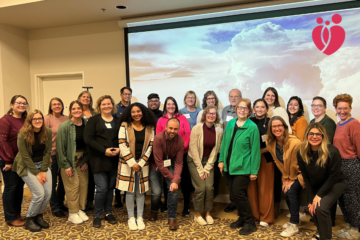Yesenia Castro – CHW and Public Health Practitioner
Yesenia grew up living in a small cabin in Oregon’s Hood River Valley. Growing up Yesenia did not know much about outdoor recreation, despite being surrounded by Mount Hood and hundreds of miles of trails. “I always saw people that didn’t look like me. I literally felt like it was not for me,” Yesenia remembers.
Recently, REI published this video/blog documenting Yesenia’s journey to climb Mount St. Helens and pursue her American dream. Watch her video and read our interview with Yesenia below.
How was it that your parents moved to Oregon/United States?
Both crossed the border multiples times, my mom twice and my dad 3. A combination of walking and with the coyotes in cars. My dad talks about the last time he crossed in u-haul jam packed like a sardine and how fast the driver drove; he didn’t think he would make it out alive that time. My dad moved to Oregon via a friend that told him there was a job for him and housing provided if he could get himself up here. My dad has since been working for that same farm/family. My mom was actually the sister of that friend my dad had and that is how my parents met. They have been living in Mount Hood Parkdale ever since.
In the video, you mention how Latinos continue to not have access to these places. Why do you think that is?
I used to take out Latinos on hikes, through a pilot program with OPHI and Willamette Partnership. Through casual talks and surveys, I found that there is an array of reasons but there are constant common denominators: lack of knowledge about how to access hikes, no driver’s license, afraid to get lost, afraid of seeing a wild animal, inadequate “gear”, reliable car, and not having someone to go with. Of course, there is more to that, but most people just need someone to help them get out there! I found that, after I took people on hikes, they were telling their friends and going on their own afterwards.
“I always saw people that didn’t look like me. I literally felt like it was not for me.” The lack of representation of people of color in the outdoor magazines you collected shaped how you viewed yourself.
How were you able to surpass this type of oppression and summit mountains? And, are there spaces where you still feel this way today?
Oh man this is such a great question. I think I have been very blessed in my life to have people around me that introduced me to many of these activities and I encouraged me to do what I loved (I have so many great cheerleaders and mentors). Because of these wonderful people, I was able to have a lot of confidence and seek out information and venture on my own. To this day, it is something I struggle with, feeling like I fit in, in the USA, in some restaurants and other day to day encounters or spaces I frequent. I have found myself in many circles and conversations as the only young-Latina woman, it is hard. I have to constantly remind myself, que si se puede, and that I also belong and have a voice.
What can be some of those most challenging and most awesome parts of being bicultural and this ability to jump between worlds?
I feel so lucky that I am able to appreciate all that my ancestors left for me, the tamales, the mariachi, the Mexican-embroidery, the smell of wet dirt…all those little things that spark in me a love so big my heart feels like it will burst every time I am around those things. I am so blessed to be able to speak and understand two languages and the cultural nuances in both. I think about that a lot, how my dad will never truly understand my love for hip-hop and other things that I’ve grown up with in the United States. All of us that are bi-cultural have been given such a beautiful gift, something no- one can take away from us. I love that I can go to Mexico and feel comfortable in a pair of boots walking down to the river to fetch water for el Chivo, but also be in Oregon and in the same comfort eating hot dogs and wearing American flag themed clothing as we celebrate the 4th of July.
The most challenging, for me personally, is how far my two country hometowns are from each other. Sometimes, I wish I could just be with my abuelita. It is so sad to have all my family all over the place, unos acá y otros allá. Also being at a loss of words in either language, the “BYE-lingual effect”, but, I try to remember that it is a blessing I know two languages. Sometimes I can’t fully express myself with the right words in English or Spanish. Also sometimes, I am in Mexico and I am referred to as Norteña or Güera, the classic quote of “ni de aquí ni de allá”. And in the USA, I am sometimes not articulate enough or ” Too Mexican”. There is a constant fight I have to deal with when people try to fit me into a neat box of who I am. I have learned to embrace the best of both worlds.
What is your favorite day hike? Asking for a friend.
Oh man my absolute favorites are syncline on the WA side just before sunset, Oneonta on a super-hot day and Wahclella for a waterfall.
Watch REI’s original video/blog post here
